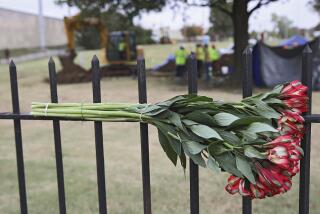A dying woman’s final gift
The “do not resuscitate” paperwork was posted on the refrigerator door. I passed it every time I made my way from my mother-in-law’s bedroom to her kitchen, to sort through the basket crammed with pill bottles for the medication she wanted.
I kept track of what I parceled out in a “meds log” mounted on the counter. The scribbled notations of family members reflect our efforts at “comfort care” — dull her pain, quiet her cough, tamp down her anxiety — and chronicle cancer’s deadly encroachment.
My mother-in-law is 83 and terminally ill with lung cancer. I went back to Ohio last week to take a caretaker turn, alongside her four sons. Her fifth son was my husband, who died 17 years ago; I fill a painful gap in the family lineup.
I’d nursed my own dying mother when I was young, before hospice care and advanced directives and morphine pumps.
I arrived experienced but unprepared for this new world order, where patients have control over lives once painfully prolonged by unassailable “doctor’s orders.”
And I returned home believing that being ushered through a terminal illness by “voluntary advance care planning” may be less expensive and more orderly, but it does nothing for fear and grief.
--
A few months ago, my mother-in-law — all of us, even her sons, call her Rene — was cutting her lawn and taking three-mile walks. Now she is tethered to an oxygen tank and can’t make her way to the bathroom alone.
I’m not sure which hurts her more: the pain of cancer invading her bones or the helplessness the illness imposes.
She has taken the reins as much as she can. Her doctors offered chemo and radiation, but she gauged her odds and turned them down. The painful treatments might have shrunk her tumor, but they held no prospect of a turnaround.
Rene spent the last 25 years caring for her stroke-impaired husband, until he died at home last spring. She doesn’t need the “death panel” counsel of physicians to see the forest through these trees.
She understands the burdens of care-giving and the reality that “do not resuscitate” does not mean you pass peacefully. And the tension between challenging and surrendering to death is, for her and us, bewildering.
“I don’t know how this happened,” Rene whispered one sleepless night, as I lay beside her in bed, stroking her soft gray hair. She never smoked, but that’s not what she means.
What she doesn’t get is the sudden turn from perpetual caregiver to pitiable invalid. “This is not how I thought it would end,” she said.
I know what the caregivers’ manual says: Encourage your loved one to share his or her feelings....
“It’s not over,” I say, leading her back through the biblical tales of miracles that she’d been sharing moments before. I mentioned Gabby Giffords and she brightened. If the congresswoman, shot in the head, could manage to sit up on the side of her hospital bed….
“I’m not giving up,” Rene said, clutching my hand with a grip tighter than that of her cancer.
She ordered me to find the remote control and to channel-surf until I found her “preaching show.” In the middle of the night, evangelists seemed to be on every channel, their message bluntly tuned to the miseries of desperate viewers.
We watched until the sun came up, past her medication point. An hour with Pastor Joel Osteen seemed to make her feel better than a dose of morphine.
--
I’m not sure how well I did my job, or even what my job exactly was.
Rene was, at times, a cantankerous patient: refusing the nurse’s suggestion of a hospital bed; demanding a wheelchair trip to her easy chair in the den; refusing to take a scheduled pain pill, then begging me to call 911 when the resulting pain could not be easily quelled.
But as she ordered us around, I saw the upside of the new order — the balance of concession and control that lifts her from self-pity and makes her not a victim but a passenger, on the final stretch of a well-trod road.
I’m grateful for those nights in the dark alongside her, listening to her stories: her childhood in Alabama, the ups and downs of her 63-year marriage, the hurts and kindnesses of friends and strangers.
The reporter in me wanted to write it all down; I felt history eroding. The daughter-in-law in me lay still and listened, marveling at her memory and laughing at her jokes.
She directed me once to get pencil and paper, then dictated a list of bequests: the bedroom furniture, her two new purses, a mink coat she bought on sale and never got a chance to put on. When she asked me, I couldn’t think of anything I wanted.
Except her recipe for sweet potato pie.
Every December for 15 years, she baked two pies and mailed them to me in California. Somehow they always survived the trip, arriving fresh and moist and sweet, wrapped in foil and newspaper, tucked among our Christmas gifts.
My first clue that she was sick had been the absence of those potato pies in our Christmas box this year. She smiled when I told her how much I’d missed them. There were two in the freezer, she confided. I could carry them back with me.
I was on the plane home before I realized I’d forgotten them. I let myself believe I’ll get them from her next time.
More to Read
Start your day right
Sign up for Essential California for news, features and recommendations from the L.A. Times and beyond in your inbox six days a week.
You may occasionally receive promotional content from the Los Angeles Times.






